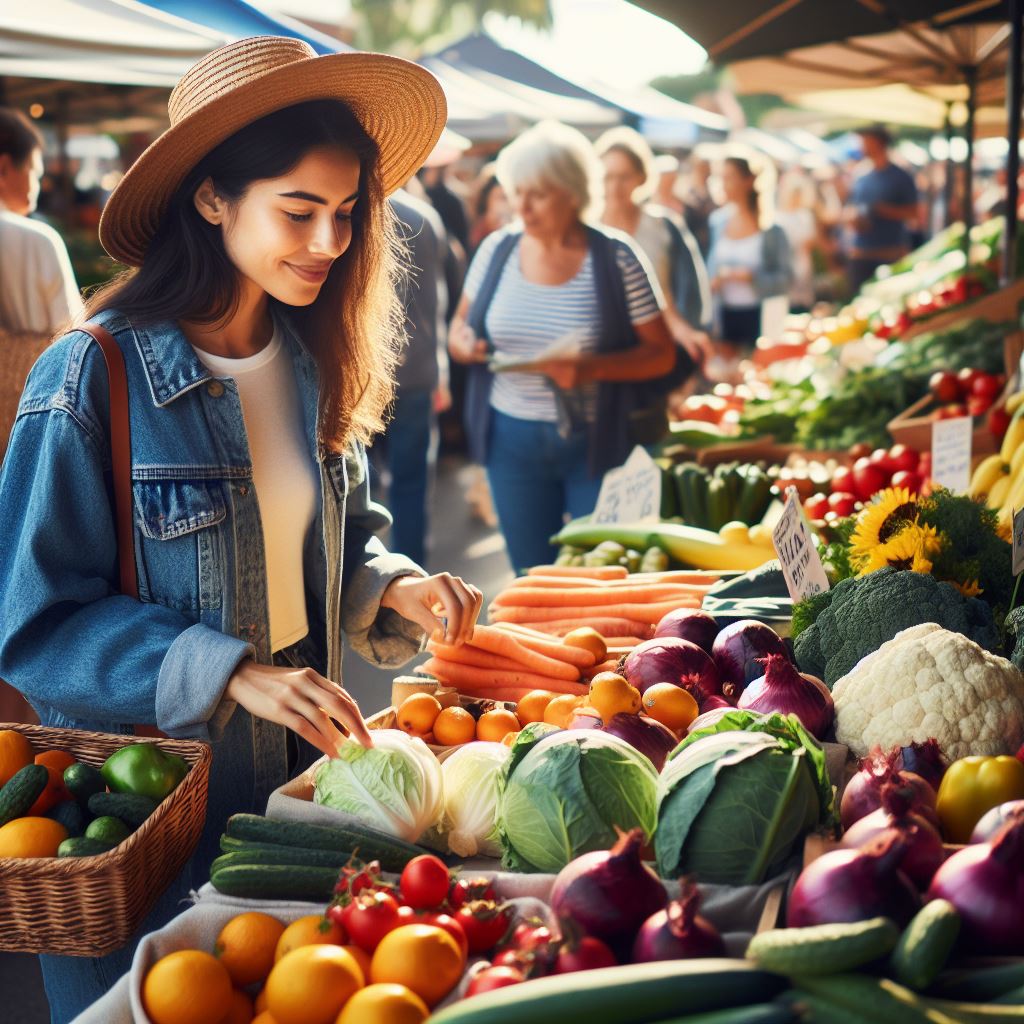Introduction
The Farmers Markets Shopper Guide provides valuable information about local markets where farmers directly sell their products to consumers.
These markets are typically held in open spaces, such as parking lots or city squares.
They offer a wide variety of fresh produce, meats, dairy products, and baked goods, all sourced directly from local farmers.
Significance of Farmer’s market
In recent years, farmers’ markets have grown in popularity.
People are becoming more conscious of where their food comes from and are seeking out fresh, locally grown produce.
Farmers’ markets provide an opportunity for consumers to interact with the farmers themselves, asking questions about farming practices and getting to know the people who grow their food.
Purpose of this blog post
The purpose of this blog post is to provide a shopper’s guide for navigating farmers’ markets.
It will offer tips on finding the best markets, understanding the seasons and availability of different products, and how to make the most of the shopping experience.
By supporting local farmers, shoppers can contribute to the sustainability of their community and enjoy the freshest, most delicious produce available.
Whether you’re a seasoned farmers’ market shopper or just starting out, this guide will help you make the most of your visits.
Stay tuned for the next section, where we’ll explore how to find the best farmers’ markets in your area. Happy shopping!
Reasons to Shop at Farmers’ Markets
Farmers’ markets are an invaluable resource for anyone seeking fresh, sustainable, and diverse food options.
Not only do they provide an array of benefits for shoppers, but they also support local farmers and foster a sense of community.
Fresh and seasonal produce
When you shop at a farmers’ market, you can be assured of the freshest produce available.
Unlike supermarket shelves where fruits and vegetables may have been transported from afar, farmers’ market offerings are harvested just hours before they are sold.
Transform Your Agribusiness
Unlock your farm's potential with expert advice tailored to your needs. Get actionable steps that drive real results.
Get StartedThis freshness not only enhances the taste but also ensures that the produce is packed with essential nutrients.
By choosing locally grown fruits and vegetables, you actively support local agriculture, helping small farmers thrive and preserving valuable green spaces.
Sustainable and environmentally-friendly practices
Farmers’ markets embrace sustainable practices that benefit both the environment and consumers.
By shopping locally, you significantly reduce transportation and packaging waste, which contributes to lower carbon emissions.
Additionally, many farmers at these markets prioritize organic farming methods, providing pesticide-free options for health-conscious individuals.
By choosing organic produce, you not only improve your own well-being but also support farming practices that protect ecosystems and promote biodiversity.
Unique and diverse food offerings
Farmers’ markets offer a treasure trove of culinary delights, featuring an extensive range of fruits, vegetables, and herbs.
You can find unique varieties that are not commonly available in supermarkets, allowing you to discover new flavors and broaden your culinary repertoire.
Furthermore, farmers’ markets often attract vendors who specialize in cultural cuisines, providing an opportunity to experience the vibrant and diverse food traditions of various communities.
From exotic spices to traditional dishes, exploring these markets is a delightful adventure for your taste buds.
Essentially, farmers’ markets have much to offer beyond a typical grocery shopping experience.
The benefits of fresh, seasonal produce, sustainable practices, and diverse food offerings make them a valuable resource for anyone who values healthy eating, environmental consciousness, and community support.
So next time you’re in search of vibrant, flavorful, and ethically sourced food, be sure to visit your local farmers’ market and savor the abundance it has to offer.
Read: Winter’s Harvest: Cooking Seasonal Produce
Transform Your Agribusiness Online Presence
Stand out with compelling content tailored to engage your audience and drive results. From blog posts to social media, we’ll create what your business needs to grow.
Get StartedTips for a Successful Visit
Research and planning
When planning a visit to your local farmers’ market, it’s important to do some research and preparation beforehand.
This will ensure a successful and enjoyable shopping experience.
One of the first steps in preparing for your visit is finding local farmers’ markets in your area.
Look for directories or online resources that provide information on market locations and which days they operate.
This will help you narrow down your options and find the one that best suits your needs.
Once you have a list of potential markets, it’s important to check their schedules.
Markets may have different operating days and hours, so make sure to plan your visit accordingly.
Some may only operate on weekends, while others may be open throughout the week.
By checking their schedules, you can avoid disappointment and ensure that the market will be open when you plan to visit.
Arriving early
Arriving early at the farmers’ market has its advantages.
Firstly, you will have access to the freshest produce available.
Local farmers often bring their freshly harvested fruits, vegetables, and other products to sell at the market.
By arriving early, you can snag the best and most coveted items before they sell out.
Additionally, arriving early allows you to avoid crowded spaces.
Unlock Farming Insights for Growth
Make smarter farming decisions with detailed reports on market trends, weather patterns, and soil health tailored to your farm's success. Boost productivity with actionable data.
Get ReportAs the day progresses, more people tend to visit the market, leading to congestion and long lines.
By getting there early, you can have a more relaxed and comfortable shopping experience.
Bringing reusable bags and cash
To make your farmers’ market visit more convenient and eco-friendly, be sure to bring your own reusable bags.
This not only reduces the need for plastic bags but also makes it easier for you to carry your purchases.
Many vendors appreciate customers who bring their own bags and may even offer discounts or incentives.
Another important tip is to bring cash with you.
While some vendors may accept credit cards or mobile payments, many still prefer cash.
This is often due to technical limitations or to avoid transaction fees.
Having cash on hand ensures that you can make purchases from any vendor without any issues.
In general, planning and preparation are key to having a successful visit to a farmers’ market.
Research local markets, check their schedules, and arrive early to enjoy the freshest produce and avoid crowds.
Remember to bring reusable bags and cash to make your shopping experience more eco-friendly and convenient.
Happy shopping at your local farmers’ market!
Read: Herbs and Spices: Grow Your Own
Navigating a Farmers’ Market
Now that we have explored the benefits of shopping at farmers’ markets and learned how to plan our visit, it’s time to delve into the art of navigating the market itself.
While these markets can be vibrant and bustling, with rows and rows of vendors showcasing their produce, navigating them efficiently can enhance our shopping experience.
In this section, we will discuss three key aspects of navigating a farmers’ market: engaging with vendors, sampling and tasting, and comparing prices and quality.
Engaging with vendors
Building relationships with local farmers can significantly enrich our shopping experience.
By getting to know the farmers, we not only learn about the produce but also gain insights into their farming practices.
This connection fosters trust and allows us to make more informed choices about the food we consume.
Don’t shy away from striking up conversations and asking vendors questions about their products and farming methods.
Farmers are usually passionate about their craft and are more than happy to share their knowledge.
Sampling and tasting
One of the unique aspects of farmers’ markets is the opportunity to sample and taste the products before making a purchase.
Take advantage of this by indulging in the flavors of various fruits, vegetables, cheeses, and even baked goods.
Sampling not only allows us to savor the freshness but also helps us make decisions about which products we would like to bring home.
Additionally, farmers’ markets often feature unusual and exotic foods that we may not find in traditional grocery stores, providing a chance to expand our culinary horizons.
Comparing prices and quality
Farmers’ markets provide an ideal setting for comparing prices and evaluating the quality of the products available.
Unlike the fixed pricing of supermarkets, farmers’ markets encourage haggling and negotiation.
However, it is essential to strike a fair balance and understand the value of the produce.
Engage with a few vendors and compare prices to ensure you are making informed purchasing decisions.
Remember, by supporting vendors with fair prices, we contribute to the sustainability of local farming communities.
In essence, navigating a farmers’ market involves engaging with vendors, sampling and tasting various products, and comparing prices and quality.
By building relationships with local farmers, asking questions about farming practices, and trying out different flavors, we can make the most of our farmers’ market experience.
Additionally, by making informed purchasing decisions and supporting vendors who provide fair prices, we contribute to the sustainability of local agriculture.
So, next time you visit a farmers’ market, embrace the vibrant atmosphere and enjoy the bountiful selection of fresh, delicious produce.
Read: CSA Boxes: Your Weekly Surprise

Making the Most of Farmers’ Market Haul
When you come home from the farmers’ market with bags full of fresh, locally grown produce, it’s time to start planning your meals and making the most out of your haul.
With proper meal planning and recipe ideas, you can create nutritious and delicious dishes using the bountiful ingredients you purchased.
Meal planning and recipe ideas
Utilizing fresh produce in nutritious meals
One of the primary benefits of shopping at farmers’ markets is the access to fresh and flavorful produce.
Incorporating these ingredients into your meals ensures that you’re consuming nutrient-rich food.
Plan your meals around the fresh vegetables, fruits, and herbs you bought.
Include them in salads, stir-fries, or smoothies to maximize their taste and nutritional value.
Exploring creative and seasonal recipes
Farmers’ markets offer a variety of seasonal produce, and it’s an excellent opportunity to explore new recipes.
Look for inspiration online or in recipe books that focus on using local and seasonal ingredients.
Try out different cooking techniques and experiment with flavors to make the most out of the unique offerings available at the market.
Proper storage and preservation
Extending the lifespan of perishable items
To ensure you can enjoy your farmers’ market finds for as long as possible, proper storage is essential.
Some vegetables and fruits are more perishable than others, so it’s crucial to understand the best way to store each type.
For example, leafy greens should be stored in a breathable bag in the refrigerator, while tomatoes are best stored at room temperature.
Take the time to research the optimal storage methods to keep your produce fresh and flavorful.
Freezing or canning excess produce
If you find yourself with a surplus of produce that you won’t be able to consume before it spoils, consider preserving it for future use.
Freezing is an excellent method for preserving fruits and vegetables.
Simply wash, chop, and store them in airtight containers or freezer bags.
Canning is another option for preserving items like jams, pickles, or sauces.
This way, you can enjoy the flavors of the farmers’ market throughout the year, even outside the growing season.
By taking the time to plan your meals and exploring new recipes, you can make the most out of your farmers’ market haul.
Incorporating fresh produce into your dishes ensures you’re getting the best flavors and nutritional value.
Additionally, proper storage techniques and preservation methods help minimize food waste and allow you to enjoy your farmers’ market finds for a more extended period.
Read: Organic Food Myths: Facts You Should Know
Conclusion
Recap of key points
Throughout this blog post, we have explored the various aspects of farmers’ markets and their importance to shoppers.
We highlighted the freshness and quality of produce found at these markets, as well as the opportunity to support local farmers and businesses.
Furthermore, we discussed the wide variety of products available, from fruits and vegetables to artisanal goods and homemade treats.
We also emphasized the sense of community and connection that farmers’ markets provide, allowing shoppers to engage with growers and learn more about their food sources.
Encouragement for readers to visit farmers’ markets
As we conclude, I want to encourage all readers to make the effort to visit their local farmers’ markets.
By doing so, you will not only experience the incredible freshness and taste of locally grown food, but you will also be supporting your community.
Remember, the farmers’ market is not just a place to shop; it is a hub of vibrant energy, where you can meet like-minded individuals and learn about sustainable agriculture.
So, grab your reusable bags and get ready to explore the bounties of your local farmers’ market!
Final thoughts on the benefits for shoppers and local agriculture
In a nutshell, farmers’ markets offer numerous benefits to both shoppers and local agriculture.
Shoppers gain access to fresh, high-quality produce, unique products, and the chance to connect with the people who grow their food.
Local agriculture, on the other hand, thrives with the support from the community, allowing farmers to continue their sustainable practices and contribute to the local economy.
By choosing to visit farmers’ markets, you are making a conscious decision to prioritize your health, the environment, and the vitality of local farmers and businesses.
So, make a difference today by supporting your local farmers’ market!




